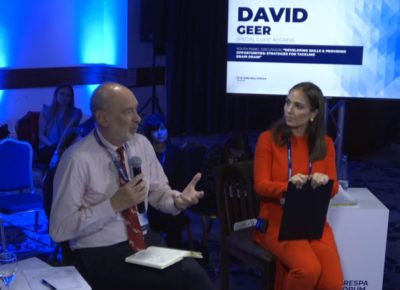YOUTH PANEL AT THE PRESPA FORUM FOR DIALOGUE 2023: CREATING CONDITIONS FOR YOUTH TO BUILD CAREERS AT HOME AND BE AGENTS OF CHANGE
Creating European job opportunities at home and reforming education to prepare young people for future professions

are crucial to prevent brain drain from the region. At the youth panel “Developing Skills and Creating Opportunities: Strategies for Dealing with Brain Drain,” representatives from the government and international institutions, youth associations, and non-governmental organizations discussed specific solutions to influence the reduction of migration, particularly among the youth, and how to encourage those who have left to return home.
“In TIDZ, we create European, well-paid jobs and opportunities for young people at home. If you decide to leave the country, then you can’t make the change. If you stay, you can try, succeed, and be the change. We have many intelligent and educated people, and their intellectual potential is what can and will move the country forward.

We all need to work together to create a future for young people at home instead of a life packed in suitcases,” emphasized Jovan Despotovski, head of the Directorate for Technological Industrial Development Zones.
David Geer, the Ambassador of the European Union to the Republic of North Macedonia, stated that the brain drain issue is a shared problem but that “the European path provides the best opportunity for young people to build their future together at home.”
Marko Georgievski, Director of the National Agency for European Educational Programs and Mobility, pointed out that the opportunities offered by one of the most influential programs, Erasmus+, which promotes youth mobility in Europe, for over three decades, is an example of how young people can apply their acquired European experience at home.
“The phenomenon of brain drain of highly qualified individuals seeking better living conditions is particularly present in the Western Balkan countries. This leads to a loss of human potential and leaves serious socio-economic consequences. To retain young people, we need to change the narrative and attitude, introduce a positive and inclusive approach, and focus on development and cooperation,” emphasized Marko Georgievski.
Maja Handziska Trendafilova, Director of RESPA, stated that “the vision for a reformed public administration is future-oriented and proven for the youth.”
“By enabling regional learning and capacity building, we focus on human capital while supporting institutions to become attractive employers and prosperous contexts for capable young talents,” said Handziska Trendafilova.
“An independent judiciary and zero corruption are important for young people to return to their home countries. For over 30 years, we have been supporting the countries in the region, and our priority is to support the youth and skill development, which is a win-win approach,” conveyed Livija Lew, State Secretary at the Swiss Federal Department of Foreign Affairs.
Representatives of youth organizations, startup communities, and universities believe that for effective brain drain management, this issue needs to be recognized as the root cause rather than a mere symptom. They also stressed the need to address problems such as corruption, lack of trust in institutions, and insufficient opportunities, which are among the main reasons for emigration.
According to the panel participants, improving skills, creating local and regional job opportunities, providing entrepreneurial support, funding research to provide attractive alternatives for migration, and encouraging young people to contribute to the development and ecosystem of their home countries, as well as establishing networks for cooperation, sharing good practices, and providing knowledge exchange programs, are part of the solutions that can help alleviate the brain drain phenomenon.
Among other participants in the panel discussion on “Developing Skills and Creating Opportunities: Strategies for Dealing with Brain Drain” were Blendi Hodai, Co-founder and Director of the Forum for Educational Changes, Igor Madzov from Startup Macedonia, Leke Zherka, Co-founder and Director of the BONVET Network from Kosovo, Andrija Mladenović, project coordinator at the Center for European Policy, Serbia, Greta Harapaj, marketing director in Aladdin, Albania, Sead Shahman, assistant professor and vice-president of the Bosniak National Council from Montenegro, Stefan Veljanovski, professor of economics at Indiana University and Blerina Zendeli from the start-up accelerator of SEEU.
To access the video recording of the discussion, click here.



